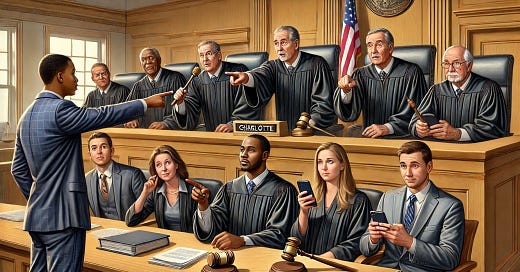Charlotte's federal judges ban use of ChatGPT in court filings
They aim to combat 'fictitious case cites and unsupported arguments'
The following article appeared in the July 15, 2024, edition of The Charlotte Ledger, an e-newsletter with smart and original local news for Charlotte. We offer free and paid subscription plans. More info here.
Federal judges in Charlotte, worried about made-up case citations, are requiring legal briefs to be written by humans
Charlotte’s federal judges, shown here in a photo illustration created by ChatGPT, have imposed a ban on using artificial intelligence to prepare court briefs.
A lot of people are experimenting with artificial intelligence nowadays. But one place that you’re now no longer allowed to test it out is in federal court filings in Charlotte.
Federal judges in the Western District of North Carolina last month directed that lawyers are not to use artificial intelligence in writing legal briefs submitted to the courts. Any brief or memo submitted to the federal courts in Charlotte must now include a certification that “no artificial intelligence was employed in doing the research” for the documents and that every legal citation has been checked for accuracy.
“Briefs and memoranda prepared using artificial intelligence (AI) platforms (e.g. ChatGPT) have increased the Court’s concern regarding the reliability and accuracy of filings,” the order states. “In particular, the Court is concerned regarding whether factual and legal citations or references in court filings have been properly vetted by counsel.”
It is signed by seven federal judges based in the Western District.
It cites no examples of troublesome court filings in Charlotte but says that the judges have noted reports of briefs in other parts of the country that have contained “fictitious case cites and unsupported arguments” generated by AI programs.
‘Smith vs. ABC Corp.’: Nationally, there have been several reports of lawyers and people representing themselves using ChatGPT to create legal briefs that invent, or “hallucinate,” legal cases in their citations. Examples include a Missouri case that cited “Smith v. ABC Corporation” and “Jones v. XYZ Company” and a New York case that cited legal precedents in “Varghese v. China Southern Airlines” and “Shaboon v. Egypt Air” — none of which were found to exist. —Tony Mecia
Need to sign up for this e-newsletter? We offer a free version, as well as paid memberships for full access to all 4 of our local newsletters:
➡️ Opt in or out of different newsletters on your “My Account” page.
➡️ Learn more about The Charlotte Ledger
The Charlotte Ledger is a locally owned media company that delivers smart and essential news through e-newsletters and on a website. We strive for fairness and accuracy and will correct all known errors. The content reflects the independent editorial judgment of The Charlotte Ledger. Any advertising, paid marketing, or sponsored content will be clearly labeled.
Like what we are doing? Feel free to forward this along and to tell a friend.
Social media: On Facebook, Instagram, Twitter and LinkedIn.
Sponsorship information/customer service: email support@cltledger.com.
Executive editor: Tony Mecia; Managing editor: Cristina Bolling; Staff writer: Lindsey Banks; Business manager: Brie Chrisman



